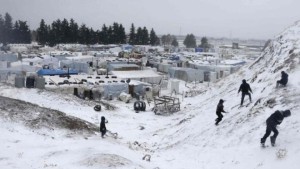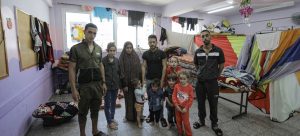Ha-young Choi
North Korea unveiled its state budget at the 9th plenary meeting of the 13th Presidium of the Supreme People’s Assembly (SPA) on Wednesday, revealing a slight decrease in the share of the budget devoted to defense costs.
The Korea Central News Agency (KCNA) reported on Thursday that North Korea spent 15.9 percent of its budget on national defense last year, with 47.5 percent devoted to the economy and 36.6 percent for education, healthcare, sports and arts.
However, as is customary, the country’s total budget was not revealed, as occured last year and the year before.
North Korea did announce for the next financial year that 15.8 percent of its budget would be spent on the military, a 0.1% decrease from the past two year’s declared allocations.
“It’s a sign of a change in North Korea’s military structure,” Kim Dong-yup, professor at the University of North Korean Studies, told NK News.
National defense accounted for 15.9 percent of the total budget in both 2014 and 2015. In April 2014, the North reported that defense expenditures had accounted for 16 percent of the budget in 2013.
North Korea annually reports its finances and budget plan between late March and early April.
“As North Korea’s nuclear development is improving, its defense expenditures are decreasing and it can convert more finance for economy and other purposes,” Kim said. However, Kim said he did not expect any significant improvements to result, considering the small scale of the country’s economy.
While North Korean official statistics generally show around 15.8 to 16 percent spending annually for defense purposes, Kim said the total percentage would likely be more than 20 percent, including money from the party leadership and munitions industry, which he referred to as the “second economy.”
“The official percentage doesn’t include costs for R&D and weaponry purchases, which is part of the secondary economy,” Kim said. “It is a characteristic of socialist countries, including China, to separate national defense and the munitions industry.”
The state-run Rodong Sinmun newspaper mentioned the Byungjin line on Thursday in its report on the budget. Byungjin is Kim Jong Un’s slogan of focusing equally on developing the economy and nuclear weapons, unlike his father’s Songun, or military-first, policy.
“Respecting the Byungjin line directed by the Workers’ Party of Korea, the state dealt with the worst crisis at the border area provoked by the hostile parties,” the article read in explaining the 15.9 percent military expenditure.
The “crisis at the border” referred to by the Rodong may have referred to the state of worsening inter-Korean relations following a landmine detonation that maimed two soldiers in August last year. North Korea made a similar argument in the 2014 budget report after the inter-Korean crisis of 2013.
“National defense expenditures, accounting for 16 percent (of the budget), were used to contain the conspiracy to provoke nuclear war and anti-DPRK movements, as well as to protect the nation’s dignity,” a similar report published in 2014 reads.
This year’s state budget resulted in surplus revenue of 1.3 percent, an increase of 5 percent compared to the last year, the KCNA further reported. The local budgetary revenue also reportedly exceeded its goal, achieving an increase to 113.8 percent of expenditures.
State budgetary revenue and local budgetary revenue refer to central and local government income, respectively, which is referred to as tax revenue in Western countries, explained Kim Young-hee, senior researcher at the Korea Development Bank.
“North Korea also has a government institute in charge of statistics and the finance ministry works on it,” she said. Kim Young-hee defected from North Korea in 2003.
The budget plan indicated the nation’s continuing interest in public works such as reforestation, construction, sports, education, culture, light engineering, fishery, agriculture and public health.
North Korea decides core decisions, including the national budget, through the SPA, which corresponds to a legislative body in Western countries.
North Korea has not published precise statistics since the 1960s and observers are often skeptical about the claims DPRK statisticians make about improving conditions.
(Ha-young Choi is an NK News correspondent based in Seoul. She studied Korean history, mainly focusing on modern Korean history at Korea University. Follow her on twitter @Hy_Choi0826)




